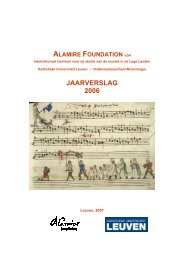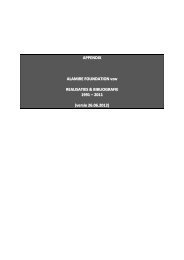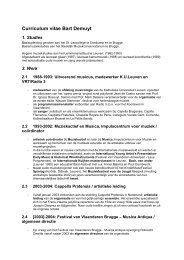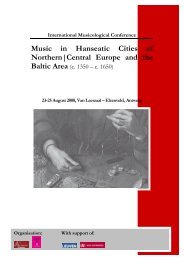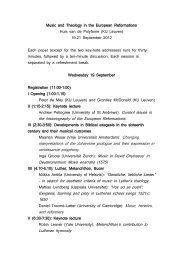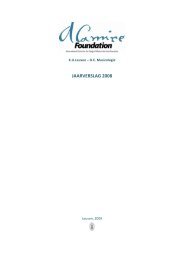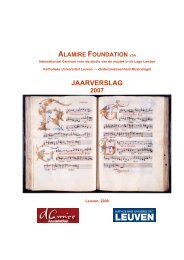YEARBOOK OF THE ALAMIRE FOUNDATION
YEARBOOK OF THE ALAMIRE FOUNDATION
YEARBOOK OF THE ALAMIRE FOUNDATION
You also want an ePaper? Increase the reach of your titles
YUMPU automatically turns print PDFs into web optimized ePapers that Google loves.
WHO OWNED LASSO’S CHANSONS?<br />
what royal officials called ‘the merit of his labors and the recovery of expenses’. 12<br />
This document envisaged broad demand for a wide range of offerings, which were<br />
to include ‘books and quires of masses, motets, hymns, chansons, as well as for the<br />
said playing of lutes, flutes, and organs, in large volumes and small, in order to serve<br />
the churches, their ministers, and generally all people, and for the very great good,<br />
utility, and recreation of the general public’. 13 Although he was the first, Attaingnant<br />
did not long remain the only music printer active in the realm. The expatriate Florentine<br />
musician, Jacques Moderne, began issuing music books in Lyons during 1538, shortly<br />
after the expiration of Attaingnant’s original privilege of 1531. 14 And when Henri II<br />
became king following the death of François I in 1547, Attaingnant’s exclusive hold<br />
on the Parisian market for printed music was briefly loosened, for his firm was joined<br />
in 1548 by a new enterprise under the control of the typographer Nicolas Du Chemin.<br />
Du Chemin’s privilege was carefully crafted so as to permit him to emulate Attaingnant’s<br />
publications – it allowed him to print books selon et de la grandeur de ceux<br />
que Pierre Attaingnant a par cy-devant imprimez. But Du Chemin’s business was to<br />
avoid directly competing with Attaingnant, and was required to issue only new music:<br />
tous livres nouveaulx en Musique (qui n’auront este imprimez). 15<br />
If royal privileges guaranteed the commercial viability of ventures of the sort<br />
undertaken by Attaingnant and other libraires, French documents remain largely silent<br />
on the sorts of protections to which composers might be entitled. To judge from the<br />
history of one musician’s works in print, it seems, the ‘work’ remained manifestly<br />
the property of its sponsoring patron, and not that of its creator. When Albert de Rippe,<br />
the celebrated Mantuan lutenist, joined King François’s private musical household<br />
during the 1530s, his extraordinary performances were held in high regard by princes<br />
and prelates who visited the French court. But if Albert enjoyed a preeminent reputation<br />
among patrons and literati of the early sixteenth century, we must infer that he<br />
had little say about how (and even whether) his music would be available to the general<br />
public. Indeed, it was not until after both his death and the death of his royal<br />
patron that his music was published edited – with permission of the new king, Henri<br />
12 Translation from D. HEARTZ, A New Attaingnant Book and the Beginnings of French Music Printing,<br />
in Journal of the American Musicological Society, 14 (1961), pp. 22–23. A facsimile of the privilege<br />
appears in HEARTZ, Pierre Attaingnant, Royal Printer of Music: A Historical Study and Bibliographical<br />
Catalogue, Berkeley, 1969, Plate 10. On the history of royal printing patents, see E. ARMSTRONG,<br />
Before Copyright: The French Book-Privilege System, 1498–1526, Cambridge, 1990.<br />
13 Translation from HEARTZ, A New Attaingnant Book, pp. 22–23. About the time that Attaingnant<br />
obtained his privilege, the Provençal composer Elzéar Genet (also known as Carpentras) commissioned<br />
a local craftsman, Jean de Channey, to print some of his sacred music. The Genet-Channey partnership<br />
was a private project, and on a scale quite different from that envisaged in Attaingnant’s enterprise.<br />
Further on these contracts, see HEARTZ, Pierre Attaingnant, pp. 110–117.<br />
14 See S. POGUE, Jacques Moderne. Lyons Music Printer of the Sixteenth Century, Geneva, 1969.<br />
15 From a privilege dated 7 November 1548, quoted in F. LESURE and G. THIBAULT, Bibliographie<br />
des éditions musicales publiées par Nicolas du Chemin, in Annales musicologiques, 1 (1953), p. 271.<br />
165



